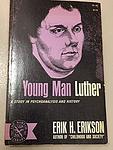Erik H. Erikson
Erik H. Erikson was a prominent developmental psychologist and psychoanalyst known for his theory on the psychological development of human beings. He is most famous for coining the phrase 'identity crisis'. His work is central to the field of developmental psychology and includes the concept of the 'Eight Stages of Human Development', which outlines a comprehensive theory of the development of the human personality and identity from infancy to adulthood.
Books
This list of books are ONLY the books that have been ranked on the lists that are aggregated on this site. This is not a comprehensive list of all books by this author.
-
1. Young Man Luther
This book is a psychological analysis of a seminal figure in religious history, focusing on his early life and the internal struggles that led to his revolutionary actions. The author, a prominent psychologist, applies psychoanalytic theory to understand the subject's tumultuous journey from a conflicted young man to a leader who would challenge the very foundations of the Church. The work delves into the protagonist's experiences with authority, his quest for spiritual certainty, and the personal crises that fueled his theological breakthroughs, ultimately shaping the course of Western civilization.
-
2. Gandhi's Truth
The book delves into the psychological and historical underpinnings of militant nonviolence as a strategy for social change. It explores the personal and collective identities that give rise to such movements, examining the life stories of key figures who have embodied this philosophy. Through a psychoanalytic lens, the work dissects the moral and emotional motivations that drive individuals to adopt nonviolent resistance despite the potential for personal harm, highlighting the powerful role of conviction and the quest for identity in shaping movements that aim to transform society through peaceful means.
-
3. Gandhi's Truth
"Gandhi's Truth" is a psychological analysis of Mahatma Gandhi's life and the impact of his nonviolent resistance movement. The book delves into Gandhi's formative years, his personal struggles, and his evolution into a national leader, examining how these experiences shaped his philosophy and actions. The author uses Gandhi's life as a case study to explore broader themes of identity, ideology, and the dynamics of social change.


